FINDING THE RIGHT LURE

Bacon’s Tackle is a real fisherman’s go-to shop, and a solid success
It’s hard to keep a secret, especially in Shreveport-Bossier.
A year or so before Bass Pro Shops opened at the Louisiana Boardwalk in 2003, the rumor mill began to churn: The wellknown retailer might be coming to town.
A lot of people — especially fishermen — were excited.
Michael Bacon was not. The third-generation owner of Bacon’s Tackle on Shreveport’s Flournoy-Lucas Road knew what a big box store with its big discount prices could mean to his business.
Death. “I knew one of the guys (at the corporate office),” Michael remembered. “I called and said, ‘I heard Bass Pro is coming to Shreveport.’ He said, ‘No, I don’t think so. Let me go across the hall, and I will call you back.’ He called me back and said, ‘Michael, Bass Pro is coming to a place called Bah-sher City.’ I said, ‘Yeah, that’s Shreveport. It’s across the river.’”
Armed with this insider knowledge, Michael and his wife began doing a little detective work.
“We drove to Branson, and there was (a Bass Pro) in Dallas. We went and looked at all their stock, so we had about a year to re-tailor our store before they opened, if we wanted to stay in business, and at that time, we did. It’s good to have friends in high places.”
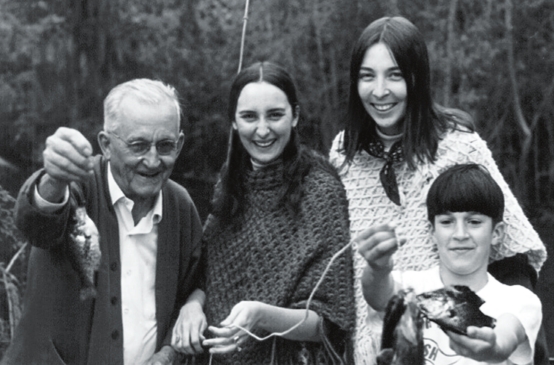
R.R. Bacon (co-founder of Bacon & Edwards, 1926), cousin Susan Williams, cousin Linda Bacon, and current owner of Bacon’s Tackle, Mike Bacon (circa 1970).
Not only did Bacon’s Tackle stay in business, but it’s still in business. Next year will mark the 100th anniversary of the business, which began in a Texaco gas station owned by Michael’s grandfather.
“A guy named Tom Hughes was the sheriff at the time,” Michael said. “He came into my grandfather’s station and saw a box of hunting shells on the windowsill. He said, ‘Are those for sale?’”
Michael’s grandfather wasn’t one to turn down a dollar.
“He said, ‘Yeah, I think so.’” Thus, it began. Ruben Rawls Bacon — everyone called him R.R. — started selling more than gas: sporting goods, hardware and washing machines. If you wanted it, R.R. had it.
“It grew and grew and grew — just exploded,” Michael said. “It was one of the largest plate glass display window stores in the United States. It was pretty massive.”
The explosion was so big the little Texaco station quickly became too little.
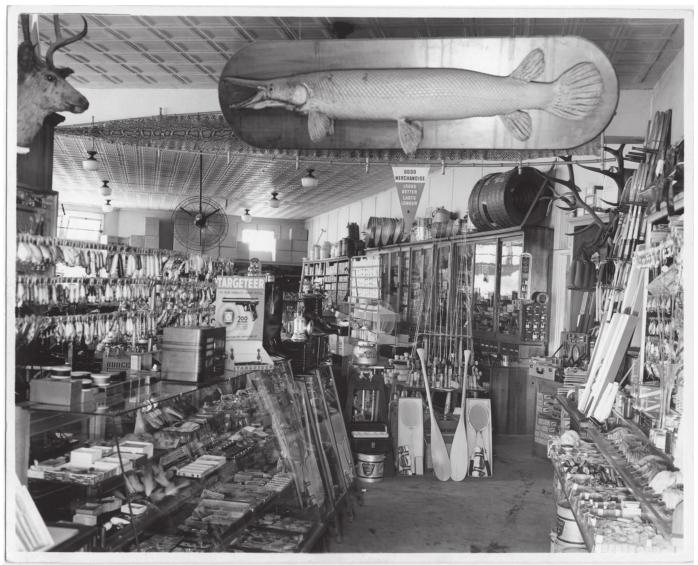
Bacon’s Tackle started humbly at a Texaco station owned by R.R. Bacon on Greenwood Road in 1926.
“When (my grandfather) got the Texaco franchise in 1925 or 1926, he put it in my grandmother’s front yard. When he wanted to add on, they moved her house back. They added on twice. Right after the war, they added on for the last time.”
While R.R. sold most everything, he was partial to anything to do with fishing.
“We all fished,” Michael said of his family. “I grew up fishing. Salt water. Freshwater. Every Wednesday, my grandfather would fish on Cross Lake. He fished in a vest, a tie, a nice shirt and nice pants. That’s the way they fished back then. He made his own boat called the Ruth Ellen. Fishing has just always been around my family.”
Eventually, Michael’s grandfather went against his better judgment and took on a partner, his great uncle, “Sonny” Edwards.
“My grandfather said a partnership is only good if one of the partners is dead.”
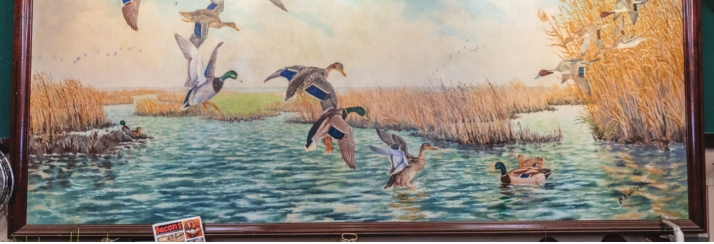
A life-size duck mural painted in 1946 by H. Brainard Wright, the original director of the Louisiana State Exhibit Museum, hangs above the merchandise at Bacon’s Tackle.
Michael’s grandfather was wrong. “That partnership was fantastic,” Michael said. “It was the best partnership he ever knew. It lasted all the way until they died.”
During that time, Bacon and Edwards not only sold fishing lures, they made fishing lures — a lot of them.
“We were the largest rubber skirt manufacturer in the world from the 1950s until about 1970.”
Michael’s father eventually bought out Michael’s grandfather but kept the Bacon and Edwards name. Then, in the late 1960s, Toledo Bend — still the largest body of man-made water in the South —opened.
Imagine going fishing and catching big bass after big bass after big bass.
Bacon and Edwards had set the hook and were reeling in dollars.
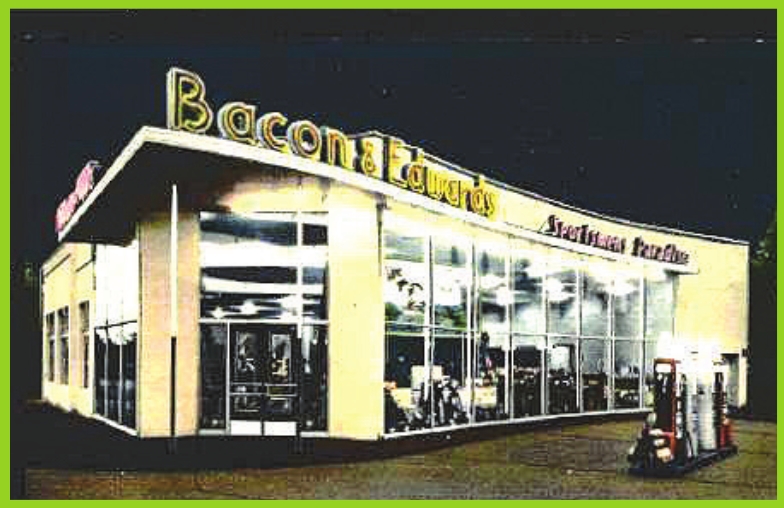
Next year will mark the 100th anniversary of Bacon’s Tackle, which specializes in hard-to-find items.
“It was perfect timing, being in the fishing lure business, and hardware and sporting goods, where you sold fishing lures — manufacture and retail. We made so much money it was crazy. You could open a box of baits and dump them out, and in a week, you would have to re-order. If you ordered the wrong color, it didn’t matter. Now, you better order the right color and the right bait, or you will have them for years.”
In 1983, Michael, who worked in the oil and gas industry after graduating from Louisiana Tech, took over running the store at its current location (his family owned another store on Greenwood Road). Now, at Bacon’s Tackle, you will find everything from an ACC Green Series Crappie Styx to Goobertail worms. Michael picks and chooses what he sells and buys direct instead of from a salesperson. Hey, you’ve gotta protect those trade secrets.
“If you’ve got an inkling of what’s going to sell, I don’t want the salesman to go down the street and say, ‘Bacon just bought a gross of this color. You better get some, too.’”
Listening to his customers has given Michael a pretty good education on which lures will attract fish and which lures won’t. But that’s not to say Michel is always right.
“One salesman came in and said, ‘We’ve come out with a new jerk bait. It’s called a Sluggo. It’s a plastic jerk bait.’ I said, ‘Sluggo? That’s the dumbest name I’ve ever heard of. It’s not going to sell. Change the name!’ Well, I was wrong. After it was all said and done, I sold over 7,000 bags of Sluggo, and the copycats, so I’ve been wrong before.”
These days, Bacon’s Tackle doesn’t compete with other mom-and-pop fishing stores.
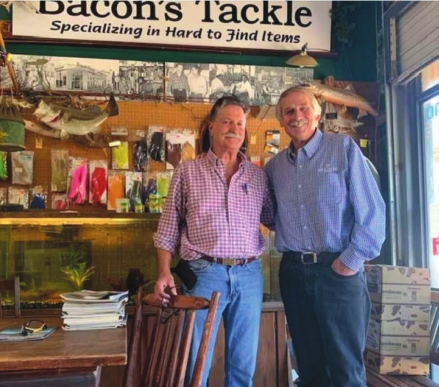
Two-time Bassmaster Classic winner and fishing legend Hank Parker stopped by Bacon’s Tackle while making a documentary on the fishing tackle industry.
Most of them have sunk to the bottom of the water. The competition for Bacon’s Tackle is Bass Pro, Academy and Walmart. But Michael’s customers — many of whom have bought from the Bacon family for a long time — would rather not go anywhere else. In fact, Michael says last year was the store’s best year in 26 years.
On a recent Tuesday morning, Dennis Adcock stopped in to get some shiners on his way to fish Cross Lake.
“They’re good people,” Adcock said of the Bacon family, who remembers going to Bacon and Edwards when he was a kid. “I come in here and tell Mike, ‘I saw this on TV. Can you get these baits?’ He gets in his book. He finds them. He orders them.”
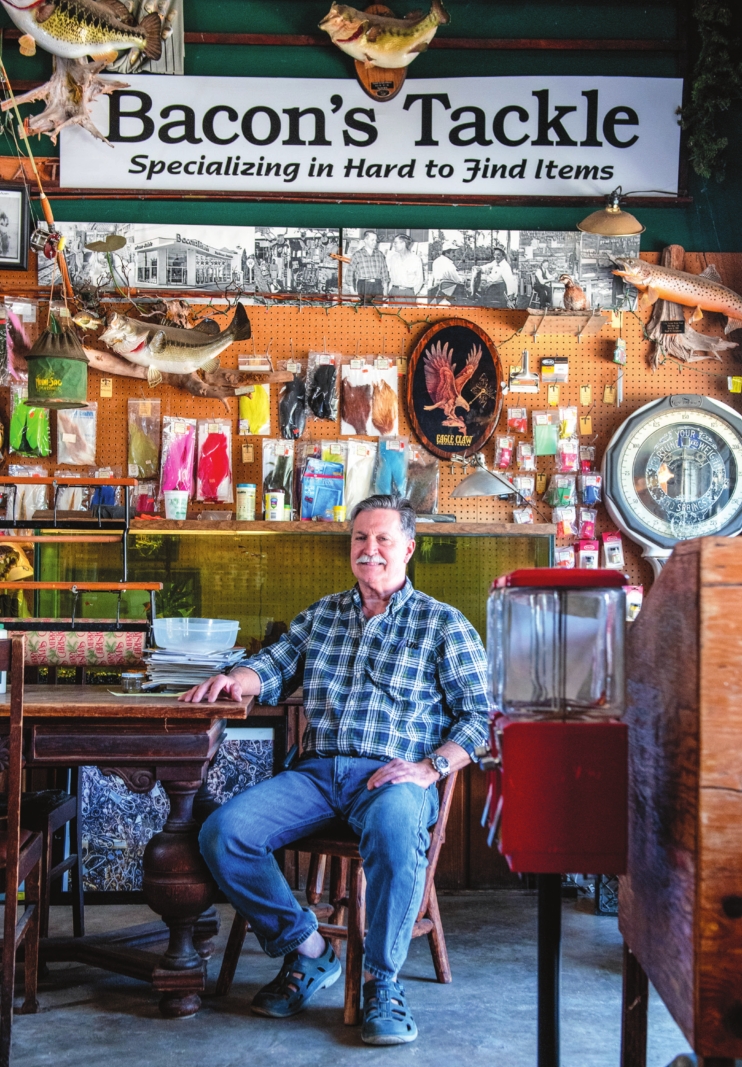
Michael Bacon is the third generation of his family to carry on his grandfather R.R. Bacon’s dream.
Don Davis has fished for 80 of his 84 years on earth. He, too, popped in on a Tuesday morning, headed to his brother-in-law’s pond near the Red River.
“My wife wanted to go fishing today. I wasn’t crazy about it. I’m tired. But she wanted to go, so she’s going fishing.”
But not without some shiners from Bacon’s Tackle.
“I like the way they treat you.
They treat me real good.”
Part of that treatment comes from Michael’s passion for fishing and getting to know his customers. Know your customers, and you will know what fish they’re catching and where they’re catching them. That knowledge is useful for Michael, the businessman, and Michael, the fishing enthusiast.
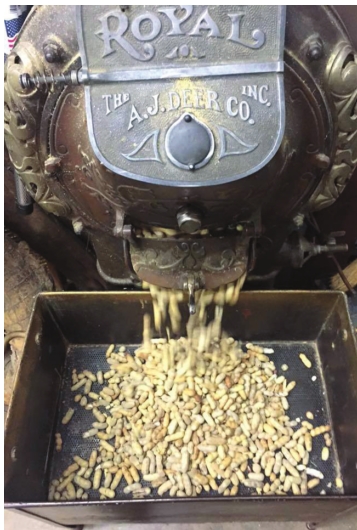
An antique Royal Coffee Roaster that was re-purposed by grandfather R.R. Bacon to roast peanuts for Bacon and Edwards is still in use today at Bacon’s Tackle. 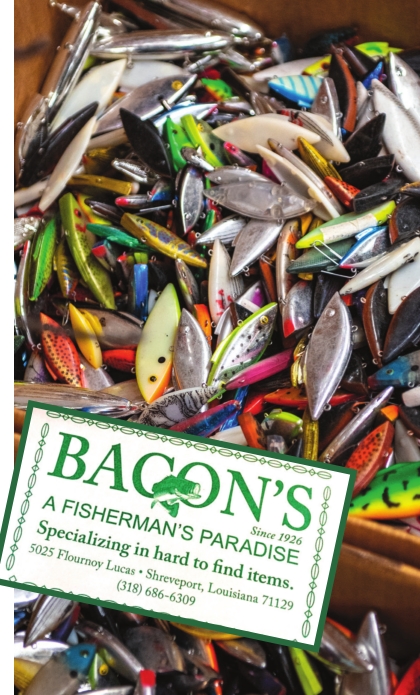
“I may be slow, but I can pick up on what they’re hitting on and where to go. Then, I will take off on what is a peak day.”
The phone rings. “I’m headed to the Sah-BEAN river,” says the voice on the other end. “Y’all got any crawfish?”
Fishing has come a long way since Michael’s grandfather sold stuff out of his Texaco station. But at Bacon’s Tackle, you will still find folding paper maps (kids, Google them) of Cross Lake, Toledo Bend and Sam Rayburn Reservoir.
Yes, in some ways, Bacon’s Tackle is still old school. It’s worked for almost 100 years, so why change bait?
